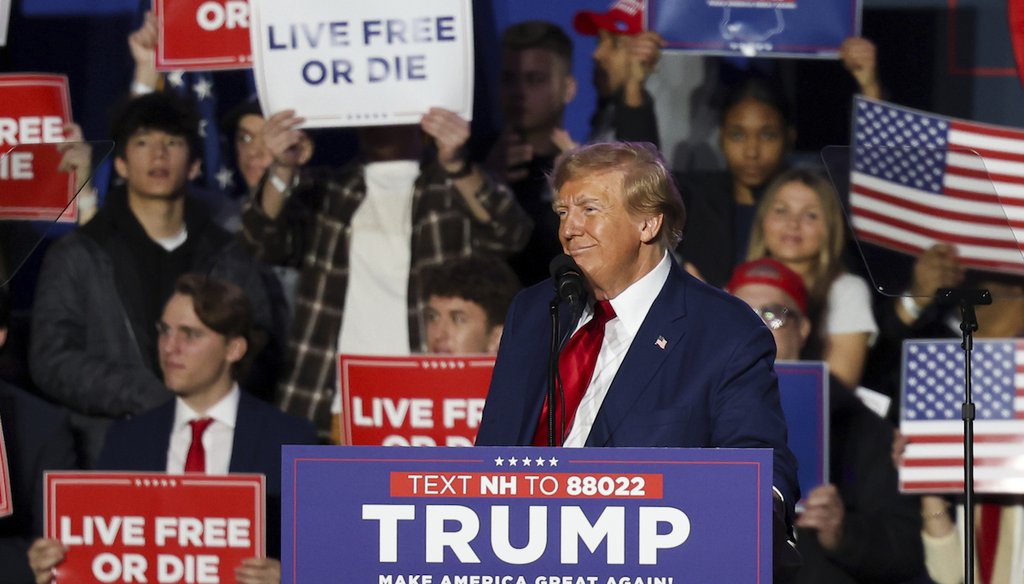Stand up for the facts!
Our only agenda is to publish the truth so you can be an informed participant in democracy.
We need your help.
I would like to contribute

Former President Donald Trump speaks at a campaign rally Dec. 16, 2023, in Durham, N.H. (AP)
DURHAM, N.H. — With 38 days to go until New Hampshire voters cast their first-in-the-nation ballots in the 2024 Republican presidential primary, former President Donald Trump told an arena full of his Granite State supporters why they should put him back in the White House.
In a 90-minute address, Trump regaled an arena full of supporters at University of New Hamshire’s Whittemore Center Arena, offering promises and painting a picture of a U.S. that he says has fallen into disrepair with high inflation, war and dirty airports.
Trump touched on many topics we’ve checked before, including falsely asserting the 2020 election was "rigged," exaggerating his administration’s actions on MS-13 gang members, and reminding supporters about his efforts to eliminate the estate tax.
Here are five claims we heard that stood out:
Claim: President Joe Biden has an "electric vehicle mandate."
Trump railed against what he called the Biden administration’s "insane, very expensive … electric vehicle mandate."
This is a mischaracterization.
The Biden administration has set a goal — not a mandate — to have electric vehicles comprise half of all new vehicle sales by 2030.
To accomplish this, his administration has pushed for incentives and loans to encourage their manufacture and use. The Inflation Reduction Act, for example, included tax credits up to $7,500 to encourage people to buy EVs. And Biden’s bipartisan infrastructure law includes $7.5 billion in EV charging investments; $7 billion for EV battery components, critical minerals and materials; and $10 billion for other "clean transportation" initiatives.
Experts told PolitiFact that although any transition will likely be complex, there is strategic benefit to offering such incentives.
"If the (Biden) administration does not incentivize an electric transition, it means the U.S. will cede EV leadership to China," said Tod Rutherford, a professor in Syracuse University’s Geography and the Environment Department and a car industry specialist. "The Europeans are very alarmed by this and especially the German manufacturers are scrambling to catch up. In other words, there is not only an environmental issue here but an economic one."
Claim: When Trump is in the White House, "We’ll go to paper ballots."
Trump’s presidential primary challenger Vivek Ramaswamy has repeatedly made a similar promise to employ "paper ballots" in future elections.
But these statements ignore that most Americans already vote this way.
Verified Voting, a nonpartisan source of voting machines information, found that in 2024, about 69% of registered voters will be living in jurisdictions that use hand-marked paper ballots.
Also, whether states or local jurisdictions use paper ballots is left up to those states and local jurisdictions. For the past two decades, states have trended toward choosing to use paper ballots and the number using them will increase in 2024 compared with 2022.
Experts say paper ballots provide the most security. Using pen and paper lets voters check over their choices and the paper trail lets officials recount elections. All of the states with close results in the 2020 presidential race had the paper record, and Georgia counted the 2020 ballots three times.
Claim: Under the Trump administration, "we built 561 miles of border wall."
Trump made a similar claim at a Pennsylvania rally in July that we rated that Half True. That’s because it depends on how it’s counted.
U.S. Customs and Border Protection data puts the total number of border wall miles built during his administration at 458 miles. But the majority of those additions replaced existing smaller, dilapidated barriers and did not add to the total miles of barriers along the southern border.
If you’re looking only at new construction, federal data shows that Trump’s administration built 52 miles of new primary border barriers where there were none before. These barriers are the first impediment people encounter if they’re trying to cross the southern border with Mexico and they can block access for people who are walking or driving.
Nevertheless, experts say Trump’s replacement barriers shouldn’t be discounted because in many cases the new barriers are superior to the old ones.
Claim: "I rebuilt our entire military."
This is an exaggeration.
The Trump administration increased military spending, but rebuilding the military would have required new equipment that takes years to build and develop.
His administration’s spending helped make troops and equipment more ready for combat, Michael O’Hanlon, a senior fellow in foreign policy at the Brookings Institution, told us in 2020 as Trump boasted of a military rebuild toward the end of his term. But overall, O’Hanlon said, Trump’s claim of a total rebuild is "hyperbole."
"Most weapons are the same as before," O’Hanlon said then. "There is more continuity than change in defense policy from Obama to Trump."
Claim: Florida Gov. Ron DeSantis supported a 23% national sales tax
Trump attacked presidential primary opponent Florida Gov. Ron DeSantis, calling him "DeSanctimonious" and saying DeSantis’ congressional record hints at what he would do if he were in the White House: "New Hampshire does not want politicians who support higher gas taxes, a 23% national sales tax like DeSanctimonious did."
When we saw this same claim in a Pro-Trump political action committee’s ad in May, we rated it Half True.
DeSantis co-sponsored the Fair Tax Act that included a proposal for a 23% federal sales tax. But Trump’s claim omits a key detail: the proposed tax would have eliminated other federal taxes, including income, estate, payroll and gift taxes and would have eliminated the Internal Revenue Service.
Trump has floated the idea himself, but never committed to it. Other times, he was more critical of the proposal. The Fair Tax Act has been introduced repeatedly in Congress since 1999, and DeSantis co-sponsored it in 2013, 2015, and 2017 along with other Republicans.
DeSantis did not push the national sales tax plan as a gubernatorial candidate, and there is no evidence that DeSantis has called for it in his bid for president.
Our Sources
Please see links in story.

































